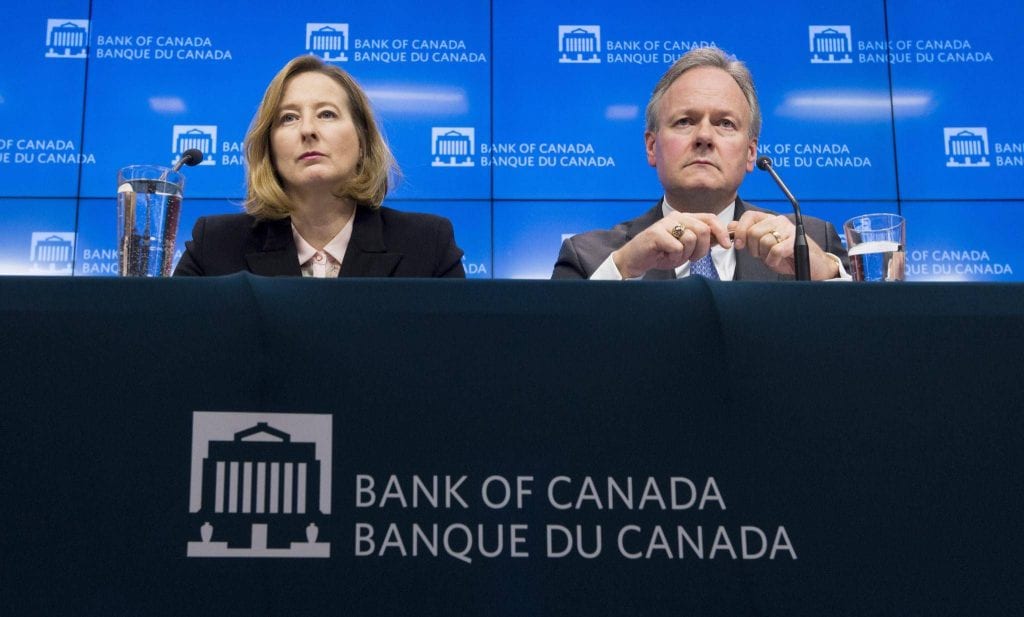
The Bank of Canada met last week to make its May interest rate decision, ultimately deciding to leave interest rates unchanged at the current key interest rate of 1.25%. Interestingly enough, the Bank of Canada Governor Stephen Poloz spoke a little less cautiously in regards to further interest rate hikes in the near term. Canadians will likely be seeing interest rates going up at least once more in the coming months due to improved economic fundamentals. Buyers and sellers may want to take advantage of affordable money while they can.
According to the Bank of Canada, interest rates were kept unchanged primarily due to uncertainties surrounding trade. This most likely refers to current issues between Canada and the United States, with NAFTA’s revisions and protectionist policies coming from the United States. The Governor feels these issues are preventing many businesses from taking steps to invest in the Canadian economy. Until these concerns are resolved, they will continue to weigh on the economy.
Aside from this, the Bank of Canada Governor would still like to see how things go with the housing market for the next few months. On January 1st, OFFSI put in new guidelines for mortgage borrowers, the most notable of which is the stress test — which forces buyers to qualify at a rate higher than the posted rate at the bank. For most buyers, this resulted in somewhere close to a 20% reduction in their borrowing ability. With those measures just working their way through the housing market, as well as the last of the fear associated with the Fair Housing Plan washing away, the Governor decided to hold off on increasing rates at this time.
Hopefully, many of our trade issues will be resolved in the coming months. Most analysts and economists expect the housing market to pick up and really move back into full steam beginning the second quarter of this year, after a lot of uncertainty. Many buyers and sellers were not certain what was going to happen after the stress test was put into place. Those are the main reasons for interest rates being held at the current level.
He did state that he believes the fundamentals of the housing market in the Greater Horseshoe are very strong, which is something we’ve supported consistently over the last 12 months. I think most would agree that the population has overreacted in the sense that the concerns have been a little too great regarding the policies that have been introduced. They really aren’t warranted to the degree that we’ve seen.
July 11th is the next Bank of Canada interest rate meeting, and we’ll hear his next decision at that point. Chances are very high that rates will go up another quarter point during this time, bringing the key interest rate up to 1.5%. Over the past few years, the Bank of Canada has been very open about the fact that interest rates have been held artificially low to stimulate growth. We are still seeing our way through the 2008 recession and the 2015 oil slump. Based on current economic performance, the key interest rate should be somewhere in the 3% range. Interest rates rising aren’t a negative thing; they’re currently too low based on our economic performance.
With things back on a normal path for the economy, rates have to normalize. This path to normalization is going to be determined based on how things perform. It’s nothing to be fearful of; this is a very carefully orchestrated economic policy. The fundamentals of our market have never been stronger and our economy is currently working at max capacity.
There are those who are worried — but these worries are unfounded. In the 1980s, when interest rates went up to almost 20 percent, the housing market suffered. It’s baseless to claim that our situation is in any way similar. Everything about the economy and the housing market today is completely different from the 1980s. We should stop focusing on the past and start looking at the current reality. The Bank of Canada, OFFSI, the Canadian government, the provincial government — no one wants to see any declines in the housing market.
The interventions of the past few months have not been meant to reduce people’s home values; they were meant to slow growth temporarily until interest rates could catch up so that the growth was on a more sustainable path. It was policy that did not result in any real change, but it did cause ripples in the form of fear and uncertainty. That was enough to slow things down temporarily until the Bank of Canada could bring interest rates up.
We are in a very large province made up of many communities. Overall, communities will see housing price growth over the next 5 to 10 years; there’s no question. Looking at things on a more local level, we will see some communities far outperform others. Hamilton and surrounding communities will outperform the majority of the province, and we will see higher than average sales growth over the next 5+ years.
All things are good. We are currently normalizing our interest rates as a result of a very strong economy. This will bring stability to the markets and is a good thing moving forward. It’s likely July 11th will see another interest rate increase — though we won’t know until the next Bank of Canada meeting.
Buyers, there’s no better time to get into the market than now, with interest rates moving into higher levels — why not capitalize on savings and get in before the next increase? We do believe there will be another in the fall; get into the market now and capitalize on historically low interest rates.
Sellers, it’s a great time to get into the market. The market in Hamilton is moving very well. The lower the interest rates, the higher the budget buyers have — and the more comfortable they are spending.


